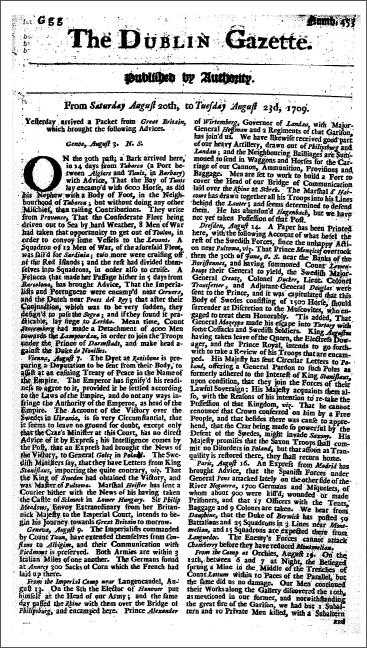
The use of newspapers for the study of family history is well known. However, the name of one of the oldest publications in Ireland, the Dublin Gazette, will be less familiar, despite its myriad of potential uses to the family historian.
The Dublin Gazette was first published on 5th November 1706 and was the official publication of British Government in Ireland and was issued monthly from Dublin Castle. As the official organ of the Irish state, The Dublin Gazette was continued after Irish Independence under the new title of Iris Oifigiuil.
Given that The Dublin Gazette was the mouthpiece of Government how can it be of use to the genealogist? A glance at the issues of The Dublin Gazette for 1800, 1890 and Iris Oifigiuil 1925 will provide some indication of the potential uses of this publication.
Together, the twelve monthly issues of The Dublin Gazette for 1800 contain some 1,100 pages and on a monthly basis contain details on the following: proclamations; these include offers of rewards for felons at large, usually with a description of the crimes committed; pardons; readings and hearings of bankruptcy cases in Ireland. These cases are drawn from all over the country heard in the Court of the King’s/Queen’s Bench in Dublin; lists of promotions, appointments and deferments in the army and navy; ships captured by the navy and the cargo/bounty of these vessels.
By the 1860s The Dublin Gazette includes a consolidated index for the year arranged under names and subject headings. The twelve issues for 1890 total some 1,460 pages plus index. In addition to the publication of promotions, appointments and deferments, Court and Castle news, new areas of interest are reported. These include bankruptcy hearings and cases from the Dublin Queen’s Bench as well as local courts of bankruptcy in Belfast and Cork; charitable bequests and the names of High Sheriffs for the ensuing year. Perhaps the area of greatest interest in the Dublin Gazette from the 1890s through to the early 1920s are the reports on the Land Commission in Ireland. In 1890 there are monthly notices of sales under the Land Commision, which include the address, the title owner, name of tenant purchaser, the date of completion of sale and the amount of advance made to the tenant.
The Dublin Gazette has been published since January 1922 as Iris Oifigiuil. The publication for 1925 contains some 1,300 pages, plus a consolidated index arranged under name and subject headings. These include appointments in the Free State Army as well as Civil, Consular and Gárdá Siochána appointments and promotions. Iris Oifigiuil includes bankruptcies, charitable bequests, creditors’ notices and even changes of name by Deed Poll; there were only two instances of this in Ireland in 1925, namely Peretz Schitenberg to Paul Steinberg and Wilson to Wilson Battley.
The largest single area of interest and indeed space in the 1925 issue of Iris Oifigiuil (The Dublin Gazette) concerns the sale and purchase of estates in Ireland resulting from the Irish Land Commission Act of 1923. Most of the estates listed were to become vested in the Land Commission and month-by-month, estate-by-estate Iris Oifigiuil publishes details on the names of sitting tenants, the acreage of their tenancies and the rents they were paying. Also included in Iris Oifigiuil are nationwide lists resulting from awards issued under the Malicious Injuries (Ireland) Act. The majority of these claims were made as a result to injuries to property in Ireland during the War of Independence and the subsequent Civil War. They include the name and address of the claimant, the amount of compensation claimed and that awarded.
The Dublin Gazette and Iris Oifigiuil are partly available online in digital format for the periods 1708-1797 and on hardcopy and microfilm in the National Library of Ireland, University College Dublin (limited), Trinity College, Dublin and the British Library.
At the website of the Oireachtas Library you can download pdf copies of the Dublin Gazette from 1750 to 1809. Each download covers a decade of the publication, which can then be searched for any term you are looking for.
